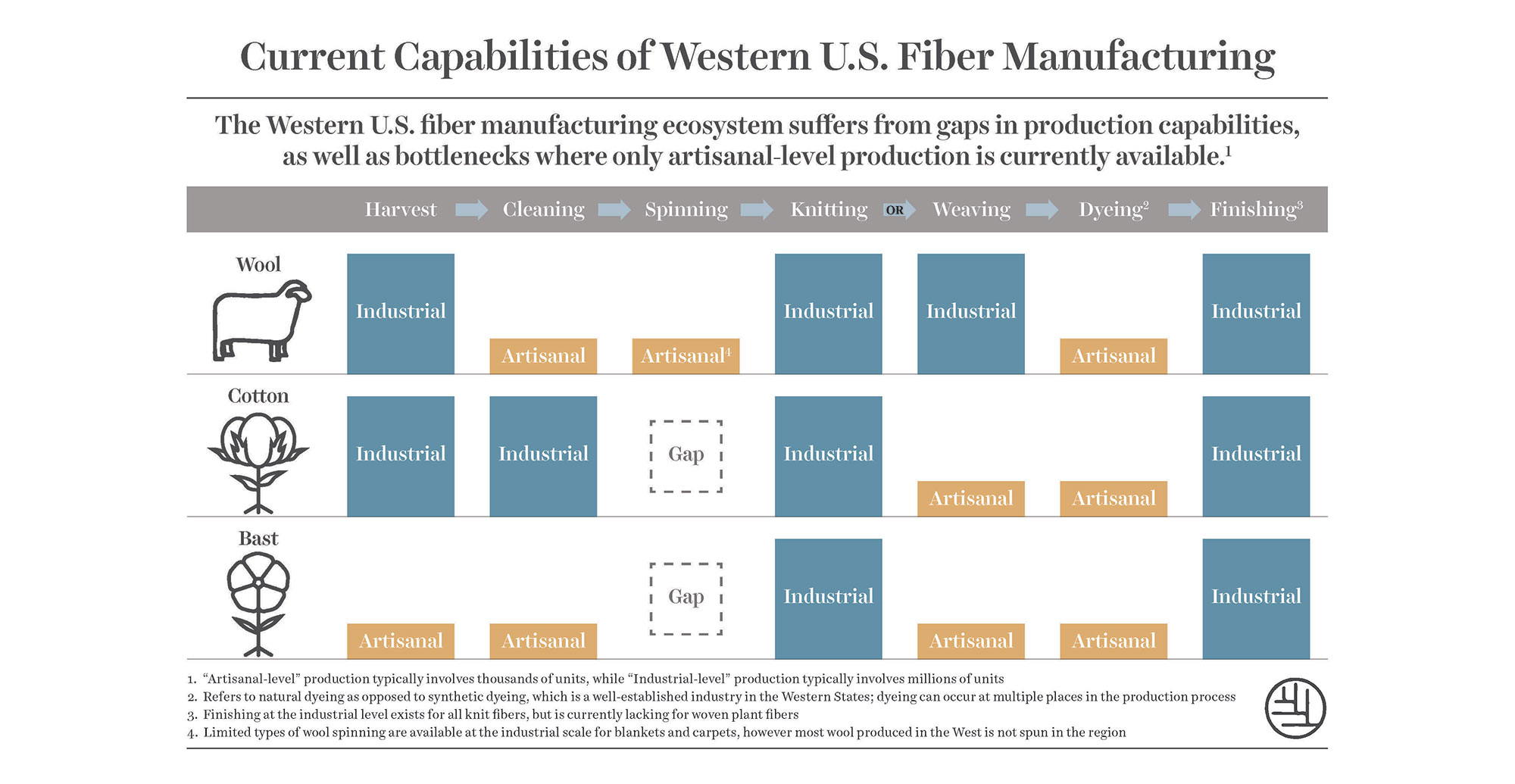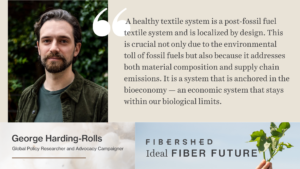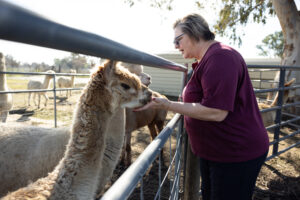The Regional Fiber Manufacturing Initiative
Catalyzing a Regenerative West Coast Fiber System

The Regional Fiber Manufacturing Initiative (RFMI) is developing a manufacturing system to regionalize the production of textiles, and foster climate solutions and community prosperity.
Local supply networks offer a significant reduction in fashion’s climate footprint: for wool, cotton, and linen we estimate ballpark manufacturing emissions reductions of about 75% when comparing renewable energy-powered local production to international or domestic production powered by grid energy.
In the Western United States, our current supply of natural fibers could provide for our clothing and textile needs while supporting Climate Beneficial agriculture and growing an equitable industry from soil to skin.The RFMI is working across manufacturing systems and with individual entrepreneurs, providing strategic visioning and technical assistance. By engaging stakeholders and experts throughout a circular soil-to-soil system, the RFMI identifies and prioritizes needs and designs solutions throughout the regional value chain.

Business ServicesWorking with Provenance Capital Group, the RFMI is creating financial models for milling systems, and organizing a network of mission-aligned investors. |
Engineering SupportEnvisioning a low-carbon value chain with “right-sized” manufacturing solutions, the RFMI team offers technical assistance, working with engineering consultant Nicholas Wenner, to identify equipment needs from fiber processing to renewable energy. |
Equity FrameworkFostering a community-based economy, we are working with equity consultant and geographer, Teju Adisa-Farrar, to assist emerging businesses in shaping their operations to support inclusive prosperity. |
Cooperative DevelopmentPartnering with the Democracy at Work Institute, the RFMI is connecting across the manufacturing system and with individual enterprises to explore participatory workplaces and industry networks. |
We envision a thriving regional textile industry where locally grown and made clothing is accessible and is a driver of ecological and economic resilience
Listen to the Soil to Soil podcast episode 12, to hear RFMI Steering Committee leaders Adrian Rodrigues and Nicholas Wenner share:
- What it would take to make our clothing regionally in the Western United States
- How much natural fiber is currently produced and how value chains can support fiber production that restores ecosystem health
- All about the process and strategy for building a manufacturing system in the Western US, and how you can begin scoping fiber milling resources in your home community
Case Study: Bridging the “Land to Hand” Gaps with the Climate Beneficial Fiber Pool
When the Covid-19 pandemic disrupted global supply systems, a new model was urgently needed to support ranchers producing wholesale volumes of Climate Beneficial verified wool. Through the Regional Fiber Manufacturing Initiative, the business advisors at Provenance Capital Group (PCG) developed a business strategy for a new multi-stakeholder structure called the Climate Beneficial Fiber Pool. As PCG shared on their blog:
“PCG supported [Climate Beneficial Fiber Pool stakeholder] Chavez in taking on the climate beneficial wool pool by helping build a business strategy, developing a predictive financial model and assessing her capital needs, and structuring and negotiating a financing structure that meets those needs. Since its launch, the wool pool has been successfully funded, the ranchers involved were able to realize revenue during the COVID pandemic, and the wool has been processed and stored… “With such a long working capital cycle, as it typically takes a year from purchasing the wool to being able to use the clean top, patient and customized capital is required to test out both the demand and supply side of the equation,” says Esther Park, CEO of Cienaga Capital, the investor without whom this project would not have been possible… The hope is that this initial investment will increase the market for climate beneficial wool where Imperial or other organizations could commit to buying one or more farmers’ whole supply on an annual basis and with sufficient premiums that benefit the farmers.”
Case Study: Refining Our Regional Capacity with Northern California Fibershed Manufacturers
How can family-owned textile mills in Northern California carve out their role in a global fiber system? With business and engineering technical assistance from the Regional Fiber Manufacturing Initiative, two entrepreneurs have successfully scoped and realized their capital and equipment needs to strategically sustain their key roles in our regional economy. One participating mill owner reflected:
“Their acumen and backgrounds in traditional finance afforded our business high-level, trusted feedback we needed to support catalyzing investment in our infrastructure, operations and inventory. From our work together, we value the various paths forward with experts like the RFMI who truly care about the evolving domestic textile community, our business goals, and the direct steps to strategize where our business thrives in it all.”
We look forward to sharing more soon on how these developments will grow the businesses and collaboratively uplift place-based textiles.

Building and scaling a regional economy begins with knowing what’s needed to meet our material needs without continuing the textile industry’s legacy of economic exploitation. In 2020, the RFMI focused on ecosystem mapping and prioritizing opportunities, and since 2013 Fibershed has been developing resources and research to foster a bioregional economy by:
- Mapping the ecosystem of fiber and textile manufacturing in the Western US, and publishing our findings that identify where capacity exists and where it does not
- Examining and highlighting case studies of how regional cooperative networks can reshape the textile industry
- Outlining a pipeline of investable opportunities in the Western United States, and contributing to a national Fibers Roadmap: Integrated Capital Opportunities to Support Revitalization of U.S.-Grown Fiber, Textiles, and Leather
- Creating an in-depth systems overview of how fiber becomes fabric, from field to finished product, summarized here in our illustrated guide to fiber processing
- Identifying fiber processing mills across the US and building an open-access National Mill Inventory
- Developing a supply analysis for California wool production and outlining a Wool Mill Vision with process flows for a renewable-powered, water-efficient system



